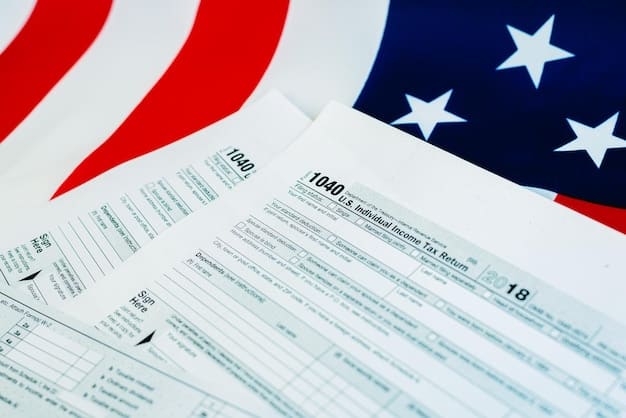US Immigration Policy Changes: A Business Guide to Navigating 2024

US Immigration Policy Changes: What Businesses Need to Know Before the End of 2024 focuses on crucial updates affecting workforce management. Understanding these changes is vital for compliance and strategic planning, ensuring businesses can effectively navigate the evolving landscape.
Are you ready to navigate the evolving landscape of US Immigration Policy Changes: What Businesses Need to Know Before the End of 2024? The upcoming year is poised to bring significant shifts that could impact your workforce and operational strategies.
Staying informed about these changes is crucial for maintaining compliance, attracting top talent, and ensuring your business remains competitive. Let’s delve into what you need to know.
Understanding the Current US Immigration Landscape
The US immigration system is a complex web of laws, regulations, and executive actions. Understanding the current landscape sets the stage for anticipating and adapting to upcoming changes. For businesses, this means staying abreast of policies that directly impact hiring, employment, and compliance.
Key Immigration Policies in Effect
Several key immigration policies are currently in effect, shaping the way businesses operate and manage their workforce. These policies address various aspects of immigration, from visa programs to enforcement measures.
- H-1B Visa Program: Allows US employers to temporarily employ foreign workers in specialty occupations.
- L-1 Visa Program: Enables companies to transfer employees with specialized knowledge to the US.
- Employment-Based Green Cards: Provides a pathway to permanent residency for foreign workers with specific skills and qualifications.
Keeping track of these policies and their specific requirements is essential for businesses to ensure compliance and avoid legal issues. Understanding the eligibility criteria, application processes, and compliance obligations associated with each visa program is crucial for effective workforce management.

Impact of Recent Executive Actions
Recent executive actions have also played a significant role in shaping the US immigration landscape. These actions can lead to swift and substantial changes in immigration enforcement, visa processing, and eligibility requirements. Businesses need to monitor these changes closely to adapt their strategies accordingly.
In conclusion, a solid understanding of the current US immigration landscape is vital for businesses seeking to navigate the challenges and opportunities that lie ahead. Staying informed and proactive can help ensure compliance, attract top talent, and maintain a competitive edge.
Anticipated US Immigration Policy Changes: What Businesses Need to Know Before the End of 2024
Looking ahead, several anticipated US Immigration Policy Changes: What Businesses Need to Know Before the End of 2024 could significantly impact businesses operating in the United States. These changes span various areas, including visa programs, enforcement priorities, and pathways to permanent residency.
Potential Changes to Visa Programs
Visa programs, such as the H-1B and L-1 visas, are particularly vulnerable to policy changes. Businesses that rely on these programs to fill critical skill gaps should prepare for potential adjustments to eligibility criteria, application processes, and annual quotas.
- Increased Scrutiny: Expect stricter enforcement of existing regulations and more detailed reviews of visa applications.
- Potential Fee Increases: Visa processing fees may increase, adding to the overall cost of hiring foreign workers.
- Changes to Eligibility Criteria: The definition of “specialty occupation” for H-1B visas could be narrowed, making it more challenging for some employers to qualify.
Preparing for these potential changes involves diversifying recruitment strategies, exploring alternative talent sources, and ensuring that all visa applications are thoroughly documented and compliant with current regulations.
Shifting Enforcement Priorities
Enforcement priorities are another area where significant changes are possible. Businesses should be aware of potential shifts in immigration enforcement policies, particularly those related to workplace compliance and employer sanctions.
Staying ahead of these potential shifts requires businesses to prioritize compliance, conduct regular internal audits, and ensure that all employees are authorized to work in the United States. Investing in robust compliance programs can help mitigate the risk of penalties and maintain a positive reputation.

Pathways to Permanent Residency
Changes to pathways to permanent residency, or green cards, could also impact businesses seeking to retain foreign workers long-term. These changes may affect the eligibility criteria, processing times, and overall availability of employment-based green cards.
In summary, businesses need to proactively monitor anticipated US Immigration Policy Changes: What Businesses Need to Know Before the End of 2024 and adapt their strategies accordingly. Staying informed, investing in compliance, and diversifying talent sources can help ensure continued success in a dynamic and evolving environment.
Strategies for Businesses to Adapt to Immigration Policy Changes
Adapting to US Immigration Policy Changes: What Businesses Need to Know Before the End of 2024 requires a proactive and strategic approach. Businesses can implement several key strategies to mitigate risks, maintain compliance, and ensure continued access to talent.
Enhancing Compliance Programs
A robust compliance program is essential for navigating the complexities of US immigration law. Businesses should invest in comprehensive training programs for HR staff, conduct regular internal audits, and stay informed about regulatory changes.
- Regular Audits: Conduct frequent audits of hiring practices and employee documentation to identify and address potential compliance issues.
- Employee Training: Provide ongoing training to HR staff and managers on immigration laws and compliance obligations.
- Legal Counsel: Establish a relationship with experienced immigration attorneys who can provide guidance and support on complex legal matters.
By strengthening their compliance programs, businesses can reduce the risk of penalties, maintain a positive reputation, and demonstrate a commitment to ethical and responsible employment practices.
Diversifying Talent Sources
Relying solely on visa programs to fill talent gaps can be risky, particularly in light of potential policy changes. Businesses should diversify their talent sources by exploring alternative recruitment strategies.
Diversifying talent sources can help businesses mitigate the impact of immigration policy changes, reduce reliance on specific visa programs, and foster a more inclusive and diverse workforce.
Leveraging Technology for Immigration Management
Technology can play a critical role in streamlining immigration management processes and ensuring compliance. Businesses should leverage technology solutions to automate tasks, track visa statuses, and manage employee documentation.
In conclusion, adapting to US Immigration Policy Changes: What Businesses Need to Know Before the End of 2024 requires a multifaceted approach that includes enhancing compliance programs, diversifying talent sources, and leveraging technology. By implementing these strategies, businesses can navigate the challenges of the immigration landscape and maintain a competitive edge.
Legal Considerations for Businesses
Navigating the complexities of US immigration law requires a thorough understanding of the legal considerations that impact businesses. From visa compliance to employer sanctions, businesses must adhere to a complex web of regulations.
Understanding Visa Compliance
Visa compliance is a critical responsibility for businesses that employ foreign workers. Failing to comply with visa regulations can result in significant penalties, including fines, sanctions, and even criminal charges.
- Accurate Documentation: Maintain accurate and up-to-date records of all visa applications and employee documentation.
- Adherence to Terms and Conditions: Ensure that foreign workers are employed in the positions and locations specified in their visa petitions.
- Timely Reporting: Report any changes in employment status or other relevant information to the appropriate government agencies.
By prioritizing visa compliance, businesses can avoid costly penalties, maintain a positive reputation, and ensure that they are operating within the bounds of the law.
Avoiding Employer Sanctions
Employer sanctions are penalties imposed on businesses that knowingly hire or continue to employ unauthorized workers. These sanctions can include fines, civil penalties, and even criminal prosecution.
To avoid employer sanctions, businesses should implement robust hiring practices, conduct thorough background checks, and use E-Verify to confirm the employment eligibility of all new hires. Investing in compliance training and seeking legal guidance can also help mitigate the risk of sanctions.
Working with Legal Counsel
Given the complexity of US immigration law, working with experienced legal counsel is essential for businesses. Immigration attorneys can provide guidance on compliance matters, represent businesses in enforcement actions, and help navigate the ever-changing legal landscape.
In summary, a thorough understanding of the legal considerations that impact businesses is essential for navigating the complexities of US immigration law. Prioritizing visa compliance, avoiding employer sanctions, and working with legal counsel can help businesses mitigate risks and ensure that they are operating within the bounds of the law. As US Immigration Policy Changes: What Businesses Need to Know Before the End of 2024 continues to evolve, expert guidance is invaluable.
Resources for Businesses Staying Informed
Staying informed about US Immigration Policy Changes: What Businesses Need to Know Before the End of 2024 requires ongoing effort and access to reliable resources. Businesses can leverage several resources to stay abreast of the latest developments and ensure compliance.
Government Websites
Government websites are a primary source of information on US immigration law. The websites of US Citizenship and Immigration Services (USCIS), the Department of Labor (DOL), and Immigration and Customs Enforcement (ICE) provide valuable information on policies, regulations, and enforcement actions.
By monitoring these government websites regularly, businesses can stay informed about the latest developments in US immigration law and ensure that they are complying with all applicable regulations.
Industry Associations
Industry associations can also be a valuable resource for businesses seeking to stay informed about immigration policy changes. These associations often provide updates, analysis, and advocacy on issues that impact their members.
Engaging with industry associations can help businesses stay informed, connect with other professionals, and advocate for policies that support their interests.
Legal and Consulting Services
Legal and consulting services can provide expert guidance and support on immigration compliance matters. Immigration attorneys and consultants can help businesses navigate the complexities of US immigration law, develop compliance programs, and respond to enforcement actions.
In conclusion, staying informed about US Immigration Policy Changes: What Businesses Need to Know Before the End of 2024 requires ongoing effort and access to reliable resources. By leveraging government websites, industry associations, and legal and consulting services, businesses can stay abreast of the latest developments and ensure compliance.
| Key Point | Brief Description |
|---|---|
| 📜 Visa Programs | Potential changes to H-1B and L-1 visa programs. |
| 🛡️ Compliance | Enhance compliance programs to avoid penalties. |
| 🌐 Talent Sources | Diversify recruitment to mitigate risks. |
| 🏛️ Government | Monitor government websites for updates. |
Frequently Asked Questions
Businesses should focus on visa programs (H-1B, L-1), enforcement priorities, and pathways to permanent residency. Monitoring these areas is crucial for compliance and strategic planning regarding US Immigration Policy Changes: What Businesses Need to Know Before the End of 2024.
Enhance compliance programs through regular audits, employee training, and by securing legal counsel. Maintaining accurate documentation and adhering to visa terms and conditions is crucial for ensuring adherence to regulations.
Explore domestic recruitment strategies, engage with educational institutions, and consider remote work arrangements. Diversifying talent sources can mitigate risks associated with evolving US Immigration Policy Changes: What Businesses Need to Know Before the End of 2024.
Employer sanctions are penalties for hiring unauthorized workers. Avoid them by implementing robust hiring practices, conducting thorough background checks, and using E-Verify to confirm employment eligibility for all new hires.
Monitor government websites (USCIS, DOL, ICE), engage with industry associations, and consult with legal and consulting services. These resources provide updates, analysis, and expert guidance for navigating US Immigration Policy Changes: What Businesses Need to Know Before the End of 2024.
Conclusion
Staying informed about US Immigration Policy Changes: What Businesses Need to Know Before the End of 2024 is crucial for businesses operating in the US. Proactive strategies, compliance programs, and diversified talent sources can help navigate the evolving landscape.
By leveraging available resources and adapting to changes, businesses can maintain compliance, attract talent, and remain competitive. Prepare your business with the tools and knowledge needed to thrive throughout 2024 and beyond.